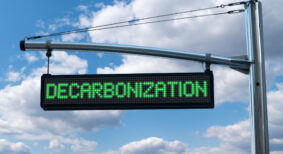In 2013, when TELUS was looking to meet its targeted environmental goals, the company increased its effort to bring in potential partners, engage recycling companies and non-profits, and document their sustainable initiatives.
It was around this time that the company heard about Green Standards, a Toronto-based firm that helps corporations in Canada and the U.S. divert used office equipment—furniture, electronics, art work, etc.—from the landfill, while also finding a home for the items at deserving non-profits. For many non-profit groups it’s a big opportunity, as few opt to spend on office improvements over their core programs and services.
TELUS decided to pilot the program, according to Geoffrey Pegg, TELUS’ director of sustainability, utilities and energy management, and by the end of 2013, three projects had resulted in a 100 per cent diversion rate with more than $25,000 worth of office equipment being donated. Since then, TELUS has engaged Green Standards for ten additional office decommissions in Vancouver, Calgary, Toronto, Montreal and Halifax. The program has also helped TELUS address its Scope 3 environmental reporting in an effort to become more transparent to stakeholders and record the true emissions from its operational footprint.
“What I really appreciated after our pilot project was the reporting that Green Standards provided,” adds Pegg. “That helped us talk about the benefits and impact that this program was having, then show that more broadly within our sustainability reports.”
Green Standards started off as a grassroots organization, but when Richard Beaumont, chief executive officer and co-founder of Green Standards, became involved five years ago, he noticed the organization was struggling due to a model that was not viable and scalable for a for-profit company.
“We ultimately took that preliminary model, pivoted it and used it to address this larger issue of furniture, equipment and corporate waste that can be treated in a much more value-based way,” says Beaumont. “Every year there are tens of millions of square feet of corporate real estate that are renovated; customers are moving; they’re revitalizing, and all that waste, furniture, equipment, IT, office supplies and some building materials—about 80 per cent of that—ends up in the landfill.”
With Green Standards, TELUS was looking for a more holistic, cost-effective approach to handling its waste. So far, the national partnership has resulted in diverting 262 tonnes of equipment from the landfill, of which 30 per cent was resold and 26 per cent was recycled. An estimated 39 per cent was donated to local charities and non-profits, valued at $234,000 and benefitting more than 20 organizations, including Parasports Québec, the Salvation Army and the Pearson Educational Foundation.
From the projects, carbon dioxide emissions have been reduced by 871 tonnes, equivalent to 22,303 trees or the amount of electricity required to power 120 houses for a year. Pegg adds the program has also been productive from an employee engagement perspective.
“We have a mix of owned and leased space and it’s incumbent upon us to try and build capacity within our partner and value chain,” he says. “A lot of our partners are committed to sustainability.”
Adobe is another company that has worked with Green Standards for years. When it was planning to renovate multiple floors in its West Tower headquarters in San Jose, the company opted to replace existing furnishings. Rather than try to sell their excess items, donating to local charities and giving back to the community seemed like the best fit. So far, the experience has been productive and positive.
“Green Standards provides a turnkey approach to our needs,” says Justina Hyland, senior manager of headquarter site operations. “We are able to use them to review what we need to have removed, bid out the removal and reach out to the local charities who will receive the items. We also get a report that gives us clear information on the value of the donations and charities that received the equipment and furnishings.”
Adobe and other companies are able to track every donation via a cloud-based portal created by Green Standards to track and report where each piece ends up. At the moment, Green Standards has a network of more than 10,000 non-profit organizations from all over North America. For each project, non-profits are quickly and efficiently notified and able to request items that can benefit their organizations.
As the awareness of social responsibility continues to expand, Beaumont, whose customers are generally large well known tenants with a significant real estate footprint, says he sees more urgency for reporting and waste tracking.
Property managers, too, have an increasing need to demonstrate to their stakeholders and tenants how they are sustainably focused, aligning with green building principles, waste diversion and social impact, for example.
“It’s a major feel-good for these organizations to make a difference in the community and demonstrate their commitment to the environment all while solving a recurring business problem,” adds Beaumont. “We report on all three in detail, and a lot of the time it’s something that will actually drive positive PR.”






